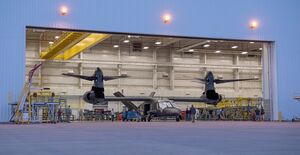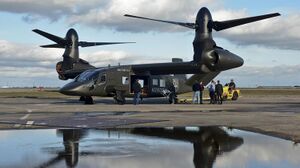Northern Rotor Works TR19: Difference between revisions
No edit summary |
No edit summary |
||
| Line 14: | Line 14: | ||
|retired= | |retired= | ||
|number built= | |number built= | ||
|primary user= | |primary user= See [[#Operators|Operators]] | ||
|more users= | |more users= | ||
|status= In production | |status= In production | ||
Revision as of 21:32, 20 December 2021
This article is incomplete because it is pending further input from participants, or it is a work-in-progress by one author. Please comment on this article's talk page to share your input, comments and questions. Note: To contribute to this article, you may need to seek help from the author(s) of this page. |
| TR19 Kite | |
|---|---|

| |
| Role | V/STOL tiltrotor high mobility aircraft |
| Manufacturer | Northern Rotor Works |
| First flight | 1 June, 2017 |
| Status | In production |
| Primary user | See Operators |
The Northern Rotor Works TR19 is a Tiltrotor aircraft developed in Orun Redisus as a successor to the widely utilized Clios Peregrine in service with the Royal Redisan Air Force and Royal Orun Army. It is capable of both VTOL and STOL landings and is the first in the Future Rotary Aircraft Procurement Directive of 2015. With the widespread use of the Aigios Raptor in Navy service, the advantages and capability of tiltrotor aircraft became more and more apparent. It was determined that a land based version of a successful tiltrotor aircraft would be a viable replacement for older helicopters in service.
The first TR19 prototype began testing in mid 2019 and was approved for introduction and production December of 2019.
Design and development
Variants
Operators
Accidents
Specifications
General characteristics
- Crew: 4
- Capacity: 14 troops
- Empty weight: 22,893 lb (10,384 kg)
- Max takeoff weight: 36,017 lb (16,337 kg)
- Powerplant: 2 × AA-18 turboshaft
Performance
- Cruise speed: 322 mph; 519 km/h (280 kn)
- Combat range: 575–921 mi; 926–1,482 km (500–800 nmi)
- Ferry range: 2,417 mi; 3,889 km (2,100 nmi)
- Service ceiling: 6,000 ft (1,800 m) can hover out of ground effect at 95 °F (35 °C)
